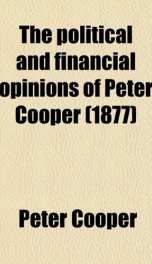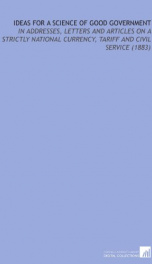the political and financial opinions of peter cooper

Purchase of this book includes free trial access to www.million-books.com where you can read more than a million books for free. This is an OCR edition with typos. Excerpt from book: tiaental wars with France in Germany and Spain alone, where nothing could be purchased except by specie, it is not surprising that guineas went where they were so much needed, and bore so high a price.' . . . ' In truth such was the need of precious metals, owing to this cause, that one-tenth of the currency of the world was attracted to Germany as a common centre, and the demand could not be supplied; and by a decree in September, 1813, from Peterwalsden, in Germany, the allied sovereigns issued paper notes, guaranteed by Russia, Prussia, and England. These notes passed as cash from Kamskatkha to the Rhine, and gave the currency which brought the war to a successful close.' " In a recent edition of the ' History of Europe,' Sir A. Alison gives an additional evidence of the important advantages which experience has demonstrated to result from the use of paper currency. " He says, ' To the suspension of cash payments by the act of 1797, and the power in consequence vested in the Bank of England, of expanding its paper circulation in proportion to the abstraction of a metallic currency, the wants of the country and the resting of the national industry on a basis not liable to be taken away by the mutations of commerce or the necessities of warit is to these facts that the salvation of the empire must be ascribed.' . . . ' It is remarkable that this admirable system, which may be truly called the working power of nations during war, became at the close of the war the object of the most determined hostility on the part of the great capitalists and chief writers of Political Economy in the country.' . . . ' Here, however,' says' Alison, ' as everywhere else, experience, the great test of the truth, has determined the question. The adoption of the opposite system of contracting t...
Users who have this book
Users who want this book
What readers are saying
What do you think? Write your own comment on this book!
write a commentif you like the political and financial opinions of peter cooper try:
Do you want to read a book that interests you? It’s EASY!
Create an account and send a request for reading to other users on the Webpage of the book!



